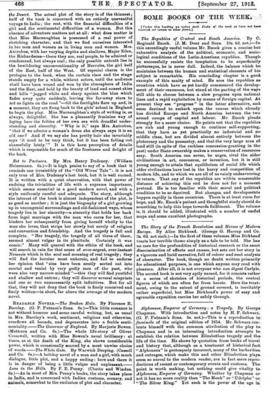Set to Partners. By Mrs. Henry Dudeney. (William Heinemann. 6s.)—It
is high praise to say of a book that it reminds one irresistibly of the "Old Wives' Tale": it is not only true of Mrs. Dudeney's last book, but it is well earned. It is written with a quiet observation, with that power of enduing the trivialities of life with a supreme importance, which seems essential in a good modern novel, and with a style uniformly careful and adequate. The story, although the interest of the book is almost independent of the plot, is as good as another ; it is just the biography of a girl growing up in uncongenial surroundings and old-fashioned ways, whose tragedy lies in her sincerity—a sincerity that holds her back from legal marriage with the man who cares for her, that hinders her subsequently from giving herself wholly to the man she loves, that strips her slowly but surely of religion and convention and friendship. And the tragedy is full and complete. "Her tragedy, the tragedy of all three of them, seemed almost vulgar in its plenitude. Certainly it was comic." Many will quarrel with the ethics of the book, and will search in vain for that sense of ever-urgent, ever-instant Nemesis which is the soul and meaning of real tragedy; they will find the heroine most unheroic, and fail to endorse her opinion that "sins have been neatly sorted out into mortal and venial by very godly men of the past, who were also very narrow-minded "—this they will find youthful and shallow and untrue ; they will discover several misprints and one or two unnecessarily split infinitives. But for all that, they will not deny that the book is finely conceived and finely written—in short, far above the average of the modern novel.










































 Previous page
Previous page